Iran-backed Hezbollah Says It Shoots Down Israeli Drone Over Lebanon
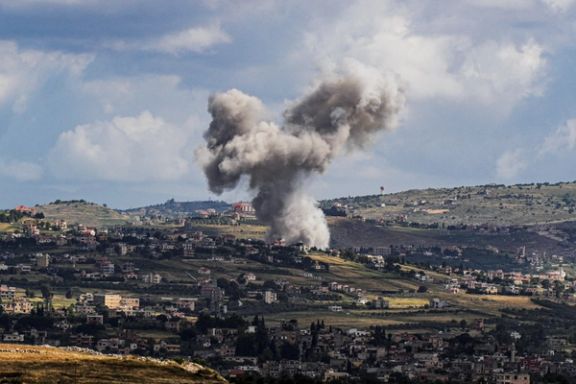
Lebanon's Hezbollah militia said its air defences downed an Israeli attack drone over southern Lebanon on Monday, and the Israeli military confirmed the loss of the drone.

Lebanon's Hezbollah militia said its air defences downed an Israeli attack drone over southern Lebanon on Monday, and the Israeli military confirmed the loss of the drone.
"A surface-to-air missile was launched toward an Israeli Air Force UAV (unmanned aerial vehicle) that was operating in Lebanese airspace. As a result, the UAV was damaged and fell in Lebanese territory," the Israeli military said.
Iran-backed Hezbollah said in a statement it hit a Hermes 900 aircraft, an Israeli-made reconnaissance and attack drone.
The Israel-Lebanon border has seen an uptick in hostilities over the past week, with both the Israeli military and Hezbollah striking locations outside the border strip where the exchanges of fire have been concentrated, and with increased intensity.
Earlier on Monday Hezbollah said it attacked with a "squadron of drones" an Israeli military post in the Golan Heights. Israel's military said it identified two drones crossing from Lebanon into northern Israel and falling in the northern part of the Golan Heights.
Israel's military also said its fighter jets struck two Hezbollah military structures and a launch post in the areas of Aitaroun and Ayta ash Shab in southern Lebanon.
(Report by Reuters)
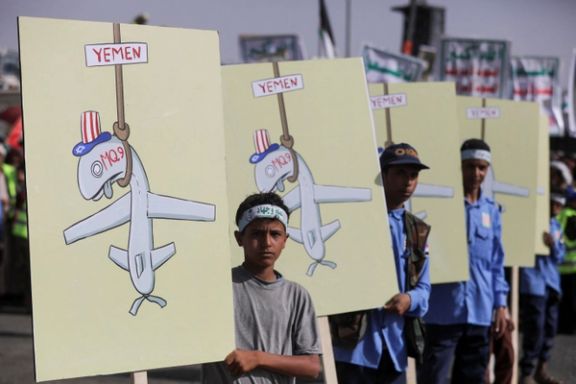
Iran-aligned Houthis in Yemen have intensified attacks on international shipping, while the Lebanese Hezbollah, Iran's most powerful proxy force, launched volleys of missiles against Israel over the past week.
UK maritime agencies reported on Sunday that two ships caught on fire after being hit by projectiles off Yemen's Aden, showing that Houthis controlling northern Yemen and supported by Tehran are determined to launch multiple attacks each day against international shipping.
The attacks began in mid-November after Iran’s Supreme Leader Ali Khamenei called on Muslim nations to blockade Israeli trade.
Hezbollah, controlling the southern region of Lebanon bordering northern Israel, has also intensified its rocket and missile attacks on Israel, prompting fears of an all-out war, as Israeli patience runs out with the worsening security situation.
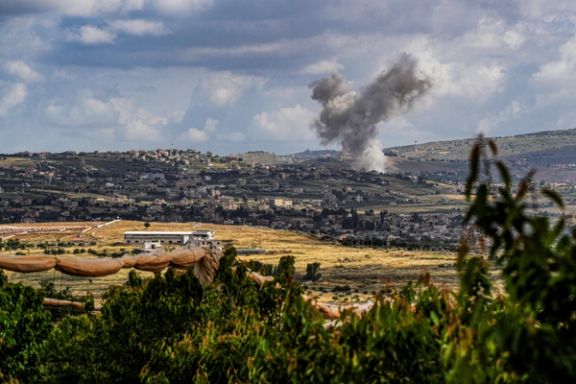
The twin flare-ups coincided with a Western initiated censure of Iran at the International Atomic Energy Agency (IAEA) Board of Governors meeting in Vienna.
A resolution tabled by Britain, France and Germany, and reluctantly backed by the United States, demanded Tehran to cooperate with the UN nuclear watchdog. Such a resolution could be the prelude to a move by Western powers to refer Iran’s case back to the UN Security Council, which could lead to the reimposition of UN sanctions.
Days before the censure resolution, the three European powers had written to the Security Council detailing Iran's violations of its 2015 nuclear deal, a step diplomats said aimed to pressure Tehran to resolve the issue diplomatically and to avoid reimposing UN sanctions.
The British, French and German letter did not explicitly threaten to "snap back" United Nations sanctions, but it noted that UN Security Council Resolution 2231, which enshrined the nuclear deal and provided that power, expires on Oct. 18, 2025.
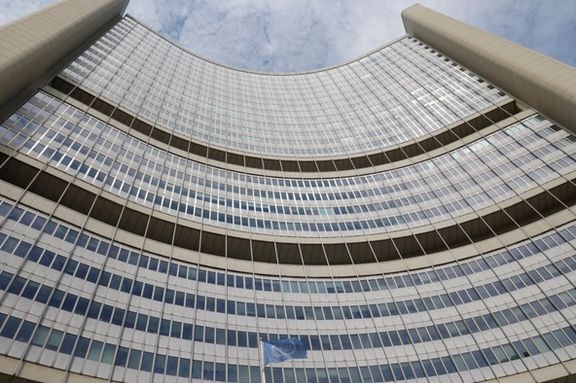
Amidst Iran's snap presidential election campaign, the reaction to the Western move has been largely controlled. However, many outside the circle of ruling hardliners are concerned about the ramifications of the IAEA resolution.
Kourosh Ahmadi, a former Iranian diplomat based in New York, told Entekhab newspaper in Tehran, that the European move could be a prelude to tabling Iran’s case in the Security Council, because that will become impossible after Resolution 2231 expires in 2025. However, Ahmadi added that at this juncture he believes the West is simply applying pressure on Iran.
As Iran’s presidential campaign kicks off in earnest following the Guardian Council's announcement of approved candidates in the coming days, the elephant in the room remains the nuclear issue and the urgent need to lift US sanctions.
For the average Iranian citizen, the prolonged economic crisis has made the main question whether there will be a reduction in sanctions. This would require Iran to demonstrate real flexibility, a decision that ultimately lies with Khamenei rather than the future president. However, the outcome of the highly regime-controlled election could provide hints about his thinking.
Commentators in Tehran tell the local media that former nuclear negotiator, Saeed Jalili, is a strong candidate because he enjoys the backing of hardliners. Two other strong candidate are Parliament Speaker Mohammad Bagher Ghalibaf and former Speaker Ali Larijani, both enjoying the backing of the wider conservative circle.
While Jalili is seen as a risky persona because of his staunch opposition to any deal with the West, Ghalibaf and Larijani are perceived as more ‘moderate’ figures. All three, however, are loyal to Khamenei.
If the election is managed in a way that Jalili becomes president, it would send a more negative message regarding relations with West, while the election of Ghalibaf or Larijani might be interpreted as a less provocative choice. The election of a hardliner other than Jalili is also possible, but overall, the new president must follow what is decided in Khamenei’s headquarters.
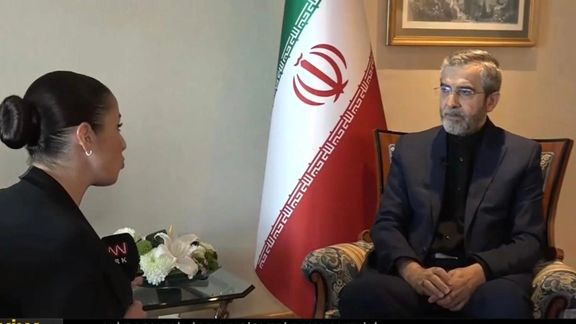
Iran's acting Foreign Minister Ali Bagheri Kani issued renewed warnings against Israeli military operations in Gaza and potential actions in Lebanon through its proxy groups.
Bagheri, speaking to CNN TÜRK, said, "They [Israel] should not forget the defeat in 2006. If they want to fall from the Gaza swamp into the Lebanese well, we do not recommend it," he stated, referring to the second Lebanon war which came to an end after UN Resolution 1701.
Bagheri's comments were made at the Council of Foreign Ministers of the Economic Cooperation Organization of the Eight Developing Countries (D-8), during which he called for an outright boycott of Israel and levied heavy accusations against Western nations, particularly the USA and Europe, accusing them of abetting what he referred to as a "massacre" in Gaza.
The Lebanese terror group Hezbollah, Iran's largest and most powerful proxy, has recently intensified its conflict with Israel, which was triggered after the October 7 attack on Israel by Iran-backed Hamas, the Lebanese proxy joining the bombardment of Iran's archenemy. Rising numbers of drones and missiles are being launched towards Israeli territory with mass fires being ignited across northern Israel. The conflict in the north has left 100,000 Israelis displaced and similar numbers displaced from southern Lebanon.
In response, Israeli Prime Minister Benjamin Netanyahu declared on Wednesday morning that Israel is "prepared for an extremely powerful action in the north" to counter the escalating assaults.
Israeli intelligence estimates indicate that Hezbollah has stockpiled approximately 150,000 rockets and missiles in southern Lebanon, all poised to target Israel.
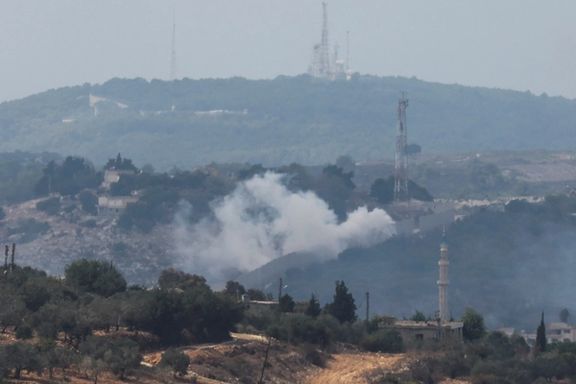
The US has issued warnings to Israel against the pursuit of a "limited war" scenario in Lebanon, citing concerns that such actions could provoke Iran to intervene, Axios reported on Thursday.
The ongoing exchange of fire between Israel and Hezbollah, which intensified since the October 7 terrorist attack by Hamas, has notably escalated in the past two weeks.
According to the report, this has led some people within the Israel Defense Forces and the Israeli Cabinet to advocate for a significant expansion of military action against Hezbollah.
US officials cautioned Israel that a "limited war" or "small regional war" in Lebanon isn't feasible as it could rapidly escalate beyond control. They further warned against a ground invasion, even in border areas, as it might provoke Iranian intervention, with a potential influx of militants from pro-Iranian militias from Syria, Iraq, and Yemen joining the conflict.
Iran-backed Hezbollah presents the greatest threat to Israel from a military perspective, according to Israeli security experts.
On Wednesday, State Department spokesperson Matthew Miller reiterated the US's profound concern regarding the risk of escalation along the Israel-Lebanon border.
“We do remain incredibly concerned about the risk of isolation along the Israel-Lebanon border. It’s something we’ve been concerned about since the immediate aftermath of October 7th, and we have been engaged in intense diplomatic conversations and intense diplomatic negotiations to try to avoid that conflict from escalating beyond control,” Miller said at the State Department press briefing.
A bloody, high-intensity war between Israel and Hezbollah last occurred in 2006 following the kidnapping of Israeli soldiers by Hezbollah. The UN Security Council imposed Resolution 1701 on Lebanon to end the conflict, mandating that Hezbollah disarm. The UNSC or Lebanon did not enforce this resolution.
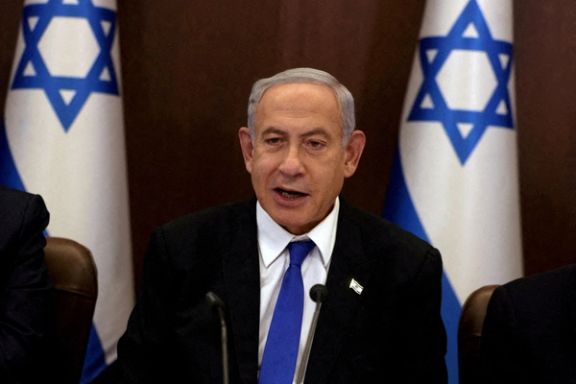
Israel's Prime Minister Benjamin Netanyahu said he will "present the truth" about the war against Hamas in Gaza when he addresses the US Congress on July 24 during a visit to Washington, Republican leaders said on Thursday.
Netanyahu will speak to a joint session of the House of Representatives and the Senate, House Speaker Mike Johnson and Senate Minority Leader Mitch McConnell said in a statement.
"I am very moved to have the privilege of representing Israel before both Houses of Congress and to present the truth about our just war against those who seek to destroy us to the representatives of the American people and the entire world," Netanyahu said in the statement.
Netanyahu's visit comes amid tensions between him and U.S. President Joe Biden, who has supported Israel's campaign in Gaza but has recently been more critical of its tactics and withheld shipment of some bombs.
It was not immediately clear if Netanyahu would meet with Biden during his US visit.
Biden's support for Israel has emerged as a political liability for the president in the run-up to November's elections, with some Democrats and voters furious over the thousands of civilian deaths in Gaza.
Republicans have also criticized Biden for his position on the war, saying he is not doing enough to help Israel.
Senate Majority Leader Chuck Schumer said in a separate statement that he had joined in making the invitation to Netanyahu.
"I have clear and profound disagreements with the prime minister, which I have voiced both privately and publicly and will continue to do so," Schumer said. "But because America’s relationship with Israel is ironclad and transcends one person or prime minister I joined the request for him to speak.”
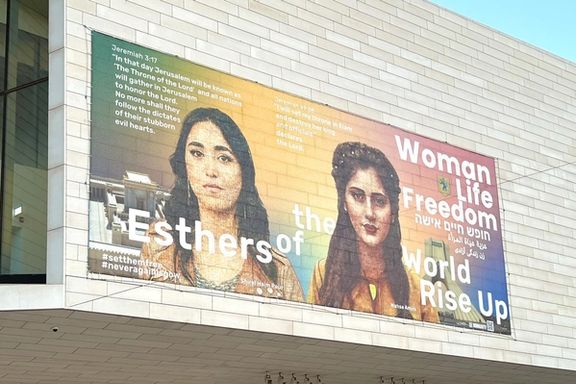
Israel's latest strategy to take on its regional rival Iran is not with a weapon, but a new tool in its soft power arsenal which aims to bridge relations between the two nations locked in escalating tensions.
It may be surprising, but the Israeli Defense Forces (IDF) has rolled out a Persian-language channel on various social media apps, highlighting the significance it sees on the relationship between social media and diplomacy.
Using the channel, the IDF speaks directly to the people of Iran and circumvents the censorship of the Iranian regime, gaining access to millions of Iranians through their social media page ‘IDF Farsi,’ which appears on Twitter, Instagram and Telegram.
“We wanted to build a bridge to the Iranian people,” said Beni Sabti, the mastermind behind IDF Farsi.
Sabti, an Israeli of Iranian origin, used to serve as a Persian spokesperson for the Israeli government on Iranian issues. He is also with the Iran program at the Tel Aviv-based Institute for National Security Studies (INSS) think-tank.
He said it may seem strange to think the Israeli army is providing the outreach, but it’s a system he believes will lead to greater understanding, more dialogue and less wars.
“We only wanted to talk to them [Iranians], and they only wanted to talk to us [Israelis]. Because we knew that these small steps will bring the big step to prevent war….it’s with a lot of emotion and from the heart,” said Sabti.
The social media account also communicates in Persian proverbs and poetic terms by making reference to great Persian poets like Hafez and Saadi.
The messaging is one of unity and kinship between Israelis and Iranians, recognizing a distinction between the people and Iran’s authoritarian government, which has repeatedly called for the destruction of Israel since the 1979 Islamic Revolution overthrew the monarchy and ushered in a clerical regime. Iran is the only country in the world where its government officially denies the Holocaust.
On the platform X, IDF Farsi recently shared a video clip with Iranian-American artist Hooman Khalili who came to Israel to paint a series of murals, celebrating the historic ties between Iran and the Jewish peoples, and raise awareness on the oppression of women and men inside the Islamic Republic.
Khalili, along with an Israeli-Iranian solider from IDF Farsi, unveiled in a video posted to social media, a mural in Israel dedicated to Iranian dissident rapper Toomaj, who has been sentenced to death for his lyrics critical of the regime. IDF Farsi soldiers are often seen in video clips with Iranian dissidents from around the world on their page.
In September 2023, IDF Farsi posted a powerful video honoring Mahsa Jina Amini - marking the one year anniversary of her death. Amini died while under the custody of the so-called morality police for allegedly wearing the hijab improperly, showing too much hair. Her death sparked massive demonstrations in Iran and around the world and was the catalyst for the Women, Life, Freedom movement.
The video uses a montage of anti-government protest videos and photos, asking “what is the price of freedom?"
Communicating information about the Iranian regime’s financing of its proxy terror groups is another message IDF Farsi conveys.
“We show them how, for example, how the regime wastes their money for Hezbollah, or for budgeting Hamas,” said Sabti.
Sabti was born in Tehran seven years before the Islamic Revolution of 1979. He was 15 years old when he and his family escaped persecution in Iran, fleeing on foot and eventually seeking refuge in Israel in 1987.
He served in the IDF’s Intelligence Corps, and as a researcher, mostly in projects related to Iranian culture, influence and media. Sabti is also with the Iran program at the Institute for National Security Studies (INSS) think-tank.
"We talk to them [Iranians] directly, above the head of the regime,” said Sabti.
Sabti told Iran International in an interview in Tel Aviv that the message is also clear to the authoritarian powers in Iran.
"We see you. We know a lot about you. We know how you act, your methods,” said Sabti.
“From time to time, Israel reveals some information that no one knows about. Suddenly we discover that there are some regime terrorists here and there, and they want to harm the Jews,” said Sabti
Iranian public opinion matters to Israel
With tens of thousands of followers, and engagement on both sides, it appears IDF Farsi has had impact and influence.
Israel, "cares about Iranian public opinion,” said Iran analyst, journalist and author Arash Azizi.
"Israel has tried to, probably with some degree of success. Actually, it has tried to influence public opinion in Iran,” said Azizi.
“Iran and Israel are in an indirect war. And the reason that a lot of countries do focus on Iran is that…the average Iranian, does not like the government and does not think like their government. So that's why they try to sort of, target them,” added Azizi.
The Netherlands-based Gamaan institute conducted an opinion survey in 2023 finding that more than 80 percent of 158,000 respondents in Iran reject the Islamic Republic and prefer a democratic government.
Azizi said the Persian language page of the US State department, for example, is failing at outreach.
“The State Department of the United States is not doing so well. You know, if I'll start with something just very basic, the very [Persian] script that they use, it's so outdated,” he said.
The European Union has an Arabic spokesperson but nothing in Persian.
“It’s a lot of resource…it's like a few hundred thousand dollars a year. So not every country will want to spend…But I think countries increasingly realize that they need to do it,” said Azizi.
While he applauds IDF Farsi’s creativity and outreach, he said how much weight the Israeli’s government's message carries to the Iranian public, is a separate issue.
“I think just purely looking at it from as an analyst. Basically they've [Israel] been able to, reach an audience in Iran. They seem to be pretty creative. They try to celebrate Iranians, you know, for example, they do videos for Nowruz and Yalda” said Azizi.
The question is, according to Azizi, is how effective would IDF Farsi’s messaging be if a full out war did take place between the two nations?
“The messaging would be much more important, but also more limited. I mean, if you ran missiles in another country, you know, what kind of messages you put on them would perhaps be of less importance in some ways. Right? So I think it's a tricky, it's a tricky situation,” said Azizi.
Social media to foster conversation despite state control
Social media expert and founder of mediatedreality.com Jesse Miller said the idea of message sharing between so-called adversarial states is not new, it’s just taken on a new form with the online world.
“If we go back in time and we think about the segregation of Germany with the Berlin Wall in Eastern versus West Germany. What we did see was messaging and news of the day being shared across the wall. So we would hear these stories of individuals on the West side, you know, taking a newspaper and cutting it so the article could be then affixed to a brick or a rock and thrown over, the wall in the middle of the night,” said Miller.
Miller pointed to a more recent example in North Korea where he said the WeChat app is increasingly being used to contact China and South Korea, to avoid surveillance from North Korean authorities.
The intent of the platform is what counts, said Miller.
“Sometimes the intent is very benign. It's just information that exists on the internet. Other times it's targeted for the purpose of making people more aware,” said Miller.
Miller said IDF Farsi “is just very targeted with specific language and from a state where potentially, you know, the sworn enemy piece turns into maybe we can just learn more about each other by using a platform where you're not necessarily having to navigate whether state can control or not.”
When it comes to opening up conversations to directly communicate to Iranians in their own language, IDF Farsi is using a platform like Twitter in a healthy way, according to Miller.
“To see Israel use a platform like Twitter to not only directly communicate to individuals who are speaking Farsi, but also communicate in a very healthy way. Some of the content that kind of bridges the gap there is positive when it comes to what we want to see for addressing issues when it comes to conflict,” said Miller.